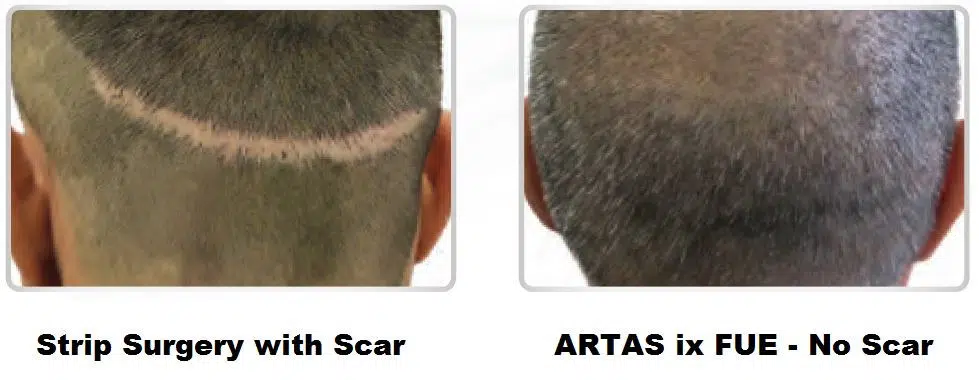There are two types of surgical hair transplants: Follicular Unit Excision (FUE) and Follicular Unit Transplantation (FUT) or ‘Strip Method’
- Hair follicles are individually extracted from the back of the scalp. This area is referred to as the donor area. The donor area is considered permanent hair and is not normally affected by hair loss.
- No strip of skin is removed; therefore there is no linear scar.
- Hair follicles are harvested robotically. The ARTAS iX robot works in conjunction with Dr. Melamed to intelligently identify and quickly harvest each follicle with extreme precision.
- Melamed selects the best hair follicles for harvesting, while skipping the less desirable hairs. FUE is quite different from FUT (described below) that removes an entire portion of the scalp
- More precise when transplanting the hair line, eyebrows, and facial hair).
- Fast recovery of the donor area, allowing patients to return to work within a couple of days. There is very minimal downtime and both the donor and transplant areas heal very quickly.
- Exceedingly popular treatment that does not leave the undesirable linear scar or suture marks seen with the strip transplantation.
- Involves removing a long strip of skin from the back of the scalp to extract hair follicles. The incision is several inches long.
- The strip is then placed under a microscope and hair follicles are divided away and prepared for transplantation.
- The donor area where the strip was removed is stitched up. The stitches are removed 10-14 days later. This leaves a linear scar.
- Strip transplantation takes a longer time to heal than FUE
Because of the technically demanding nature and advanced technology, FUE tends to be more expensive than FUT. People prefer to pay a higher price for FUE to avoid the longer downtime and long-lasting linear scar that is visible with the Strip method.
It is important not to choose a procedure based on cost alone. Select the hair restoration method that will yield a natural looking result for you.
A hair transplant procedure affects you for the rest of your life and choosing an inappropriate procedure to save money is not a good idea. The surgeon you choose for your hair transplantation procedure is equally important. How do you choose your doct0r for hair transplant?
You want to make sure your surgeon and their medical staffs have skill and experience in hair transplantation. Hair transplantation requires both technical skill and a high degree of artistry. Your physician and their surgical staff must pay attention to the angle, density, and positioning of grafts to make sure it matches your expectation and desired outcome.
Ask your surgeon to share before/after photos of their work to familiarize you with their style and outcome.
Inquire about experience and training in their field. This can usually also be obtained on their website and bio. Dr. Melamed has over 20 years of experience treating men and women with hair loss. He is both a doctor and an artist, providing the best care and the most natural looking results.


